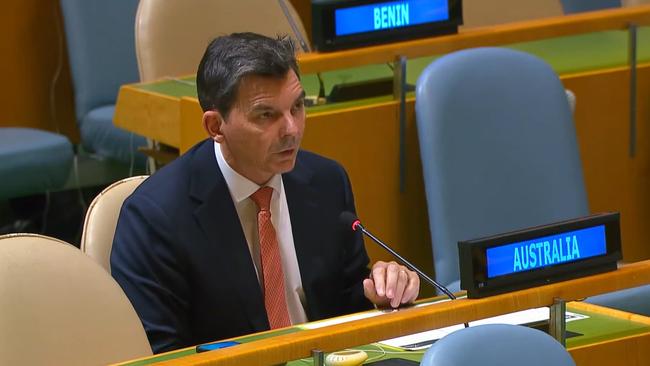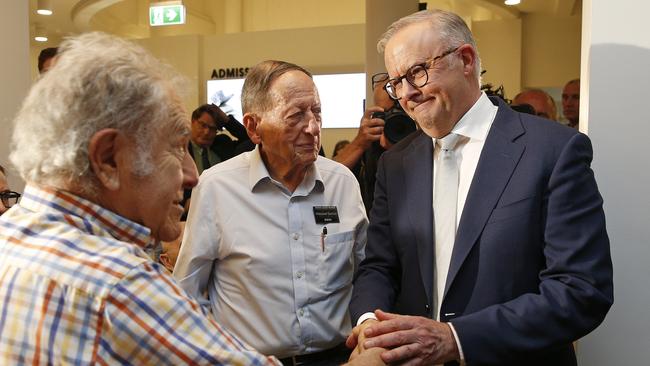Palestinian general delegation says Australia moving in ‘right direction’
The Palestinian general delegation to Australia has expressed ‘deep appreciation’ for Labor’s shifts on the global stage.

The Palestinian Authority’s representatives in Australia have trumpeted Labor’s efforts to increase their power in the UN and called for more funding for the UN aid agency with ties to terror group Hamas.
A day after Anthony Albanese pleaded for unity to stamp out anti-Semitism while defending his government against claims its support for anti-Israel motions at the UN was encouraging attacks on Australian Jews, the nation’s leading Palestinian lobby said Labor’s moves on the global stage sent a “powerful message” to Israel.
“The general delegation of Palestine acknowledges with deep appreciation the positive trajectory of the Australian government in increasingly recognising and supporting the inalienable rights of the Palestinian people,” the delegation’s head, Izzat Salah Abdulhadi, said.
“Recent achievements in the international legal struggle for Palestinian rights send a powerful message to Israel, the occupying power, that the rule of law will prevail; Israel’s unlawful occupation will end and the legitimate rights of the Palestinian people, including the right to self-determination, will be achieved.”
Australia joined an overwhelming majority of countries in the General Assembly on Thursday morning AEDT backing an emergency UN resolution demanding an immediate ceasefire in Gaza that was not tied to the release of Israeli hostages.
It also included no requirement that Hamas be removed, and called for the UN’s Palestinian aid agency, UNRWA, to be given unhindered access to Gaza.
Australia’s ambassador to the UN, James Larsen, said Australia had reservations about the wording of the resolutions but voted for them because it was committed to ending the suffering in the Palestinian enclave.
“The current situation in Gaza is catastrophic, the human suffering unbearable,” he said. “Israel must take urgent action to alleviate this humanitarian crisis, in line with the binding orders of the International Court of Justice.”
Mr Salah Abdulhadi said he welcomed Australia’s reaffirmation of support for UNRWA and urged the government “to increase its financial support to the agency accordingly”.
He also condemned all attacks on Australian Jewish communities, which he said did “not serve the Palestinian cause or represent Palestinian interests”.
The UN vote came as Labor MP Josh Burns accused Melbourne University of “saying a lot but doing very little” to stop the targeting of Jewish staff and students after its vice-chancellor revealed there had been more than 150 incidents of anti-Semitism on campus in the past 12 months.
Executive Council of Australian Jewry president Daniel Aghion said the ceasefire resolution was immoral, expecting Israel to “betray its own citizens”.
“By calling for an immediate, unconditional and permanent ceasefire in Gaza, the General Assembly is effectively demanding that Israel abandon the hostages to their fate, and allow the Hamas terrorists to re-establish themselves as the de facto rulers of Gaza,” he said. “If this resolution were to be put into effect, it would be a green light to Hamas to regroup, rearm and prepare for a terrorist attack against Israel.”
Australia/Israel & Jewish Affairs Council executive manager Joel Burnie said the government had again voted for a resolution “that is starkly at odds with its own policy”.
“It calls for ‘immediate, unconditional and permanent ceasefire’ – an outcome guaranteed to leave Hamas permanently in control over Gaza – even though both the Prime Minister and Foreign Minister have repeatedly called for Hamas to play no future role in ruling Gaza,” he said.
Their anger was compounded by the timing of the move, which came less than a day after the Prime Minister’s emotional appeal for the nation to come together to end the “evil” of anti-Semitism.
The plea followed anti-Semitic graffiti attacks on three Sydney properties, and the torching of a Melbourne synagogue last week.

The US and Israel were among nine countries to reject both resolutions, as Australia voted with nearly 160 countries including Five Eyes partners the UK, Canada and New Zealand.
It came just over a week after the government outraged Israel and Australia’s Jewish community by switching its vote in the UN to support Palestinian statehood and demand Israel’s withdrawal from the occupied territories, after opposing or abstaining on the same resolution for two decades.
Opposition home affairs spokesman James Paterson said Labor was “trading votes at the UN for votes in the inner city and western Sydney”.
“They are putting their political interests ahead of the national interest. Voting for extreme, one-sided motions at the UN won’t bring peace in the Middle East but it will give even more license to anti-Israel extremists in Australia,” he said.
The Australia Palestine Advocacy Network commended the government for backing the motions, saying they were a crucial step in standing up to Israel’s “systemic oppression and brutal violence” against Palestinians.
“The overwhelming global consensus reflected in these resolutions underscores the undeniable truth: Israel must stop its genocide in Gaza right now,” APAN president Nasser Mashni said.
A parliamentary inquiry heard on Thursday that anti-Semitism had exploded on campus at the University of Melbourne, with 147 incidents reported by security staff between January and September, and a further 12 since October. They included vandalism and the appearance of offensive posters.
The university’s interim vice-chancellor, Nicola Phillips, confirmed that none of the 27 students and staff who occupied a building on campus earlier this year had been banished from the institution. “They were issued with formal warnings,” Professor Phillips said. “That is not a light outcome.”







To join the conversation, please log in. Don't have an account? Register
Join the conversation, you are commenting as Logout